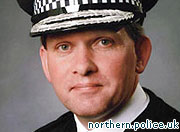Scottish police officers could be forced to investigate ‘hate incidents’ that took place up to ten years ago – even though no crime was ever committed.
The alarming policy comes in light of the new ‘hate crime’ guidance published by the Association of Chief Police Officers in Scotland (ACPOS).
Critics say the definition of a hate incident is worryingly elastic. The guidance states “a hate incidence is any occurrence (where a crime has not occurred), which is perceived to be a hate incident by the victim or any other person.”
Warnings
News that police officers will be forced to investigate incidents that allegedly occurred a decade ago prompted warnings that officers could be flooded with old or unfounded allegations, hindering other important cases.
Dr Gordon Macdonald, of CARE for Scotland, said: “The police could be swamped with frivolous, historic claims – and that is in no one’s interest.”
A spokesman for ACPOS, when asked if old claims of ‘hate crimes’ or ‘hate incidents’ dating back a decade could be investigated, responded: “Yes there would be no reason why it could not be looked into.”
Perceived
The guidance gives an example of a ‘hate incident’ where two Asian men are refused entry into a nightclub because they are wearing jeans.
The incident would still be logged on police records as a ‘hate incident’ if the men, or a third party, ‘perceived’ the refusal as being racially motivated, even though it was because the club has a ‘no denims’ policy.
The Hate Crime Guidance Manual was launched by the Association of Chief Police Officers in Scotland.
Penalties
It follows legislation introduced in Scotland earlier this year which stipulated that people who commit ‘hate crimes’ against homosexuals, transsexuals and the disabled will face tougher penalties.
Legal experts have warned that the legislation would create ‘two-tiered’ justice by giving special treatment to minorities, rather than all victims being treated equally.
The ACPOS guidance has been criticised for stating that police officers should treat crimes against homosexuals and minority groups more seriously than general crimes against the public, in a drive to increase the reporting of so-called ‘hate crimes’.
Skewed
In September one of Britain’s top police officers warned that the police were chasing politically imposed targets instead of dealing with real crime, leaving yobs to run amok.
Sir Denis O’Connor, Chief Inspector of Constabulary, warned that bureaucratic targets imposed by central Government had skewed policing priorities.
And earlier this year a report by the Civitas think-tank cautioned that Christians in Britain were being unfairly targeted for hate crime prosecutions.
Gagged
The report, entitled A New Inquisition: Religious Persecution in Britain Today, also warned that existing hate crime legislation poses a danger to freedom of speech.
The report cited the example of Ben and Sharon Vogelenzang who were prosecuted for a hate crime, under Section 5 of the Public Order Act, last year after they engaged in a breakfast debate about Islam with a guest at their hotel.
The couple, who were supported by The Christian Institute, were declared innocent last December but the ordeal has caused the couple serious financial hardship.
By contrast the report also cited the example of a Muslim man who escaped prosecution for a hate crime despite defacing a war memorial with slogans such as “Islam will dominate the world – Osama is on his way”.

